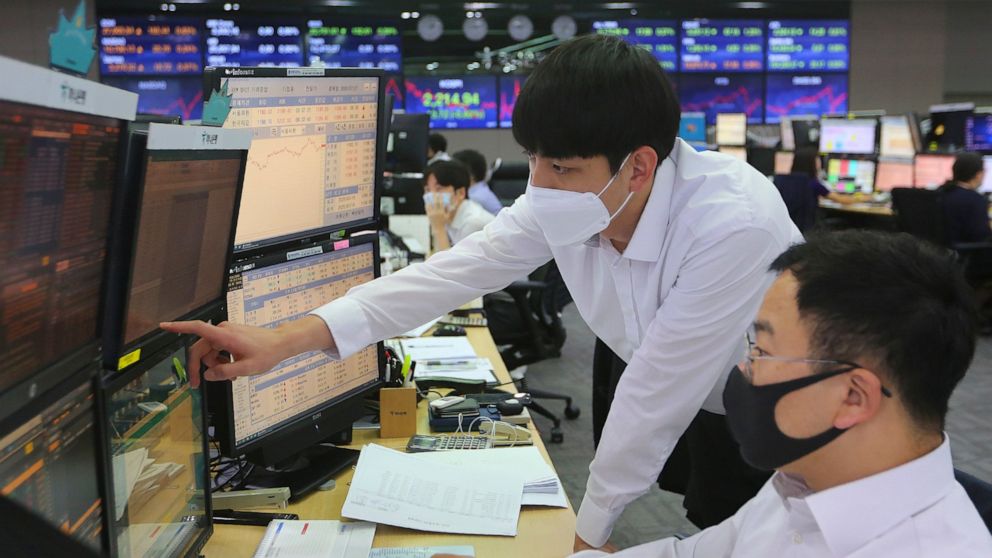Global shares mixed as China-US tensions cast shadow
MITO, Japan — European shares opened higher Thursday and U.S. futures also advanced after a mixed day of trading in Asia.
Benchmarks rose in Paris, Frankfurt, Hong Kong and Sydney but fell in Shanghai and Seoul as positive momentum from an upbeat close on Wall Street overnight helped offset negative economic data. Markets are closed Thursday and Friday in Tokyo for a national holiday.
Investors have been sizing up mixed corporate earnings and flaring tensions between the U.S. and China.
The Kospi in Seoul lost 0.6% to 2,216.19 after South Korea reported that its economy contracted 3.3% in April-June. The economy shrank 1.3% in the first quarter. In annual terms, the economy contracted at a 2.9% pace.
Exports fell 16.6% as demand was hammered by the coronavirus pandemic, the central bank reported in a statement on its website.
Australia’s S&P/ASX 200 added 0.3% to 6,094.50, even after Josh Frydenberg, the treasurer, said data showed the economy contracted 7% in the last quarter.
“Our economy has taken a big hit and there are many challenges we confront,” he said.
India’s Sensex picked up 0.5% to 38,075.19.
It was unclear if simmering tensions between Washington were swaying investors in Asia, where Hong Kong’s Hang Seng gained 0.5% to 25,189.38.
The benchmark Shanghai Composite index gave up early modest gains, losing 0.2% to 3,325.11.
Further roiling already fractious relations, the U.S. ordered China to close its consulate in Houston, saying it was necessary to protect American intellectual property.
China said it would retaliate, and there was speculation that the U.S. Consulate in Wuhan, central China, might be ordered to close. But the Hong Kong newspaper South China Morning Post, quoting an unnamed source, said the U.S. Consulate in Chengdu, in western China’s Sichuan Province, would be the one targeted for closure.
Antagonisms are bound to heat up as presidential contender Joe Biden and President Donald Trump ramp up their campaigning, analysts said.
Whether the U.S. ends up having to close a consulate in mainland China or in Hong Kong “misses the forest for the trees,” said Hayaki Narita of Mizuho Bank.
“Whereas the real worry ought to be about strategic relations descending into ‘Cold War’-like dynamics; in which room for dialogue is supplanted by heated diatribe,” he said in a commentary.
The Shanghai Stock Exchange added companies from its new technology board to the Shanghai Composite Index on Wednesday in the index’s first major change in three decades.
To help better reflect business performance, companies that receive financial warnings will be removed from the index, the exchange said. The waiting period for adding newly traded stocks will be extended from as little as a few days to as much as one year.
Overnight, the S&P 500 picked up 0.6% to 3,276.02, its fourth session of advances. It is within 3.3% of the all-time high it set in February.
So far, earnings have been coming in moderately better than expected, though companies have worked to lower expectations.
Discord between Republicans and Democrats over more financial aid to Americans and U.S. businesses is another worry, as states grapple with rebounds in coronavirus cases.
Gold for August delivery rose another $3.10 to $1,868.20 an ounce, after jumping $21.20 to $1,865.10 an ounce overnight in another sign investors were shifting some holdings to traditionally less risky assets.
The price of benchmark U.S oil for September delivery rose 8 cents to $41.98 per barrel in electronic trading on the New York Mercantile Exchange. It fell 6 cents to settle at $41.90 a barrel Wednesday.
Brent crude oil for September delivery picked up 10 cents to $44.39 per ounce.
In currency dealings, the U.S. dollar fetched 107.14 Japanese yen, down from 107.16 yen late Wednesday. The euro strengthened to $1.1578 from $1.1569.
———
AP Business Writer Joe McDonald in Beijing contributed.
![]()


